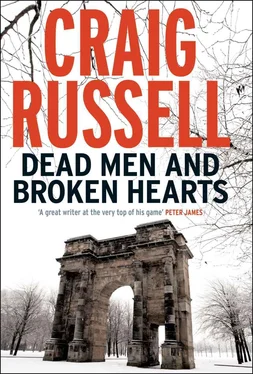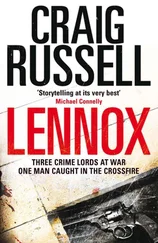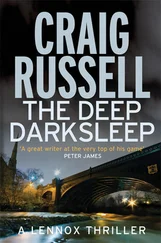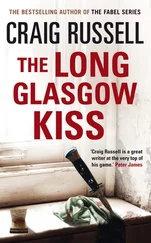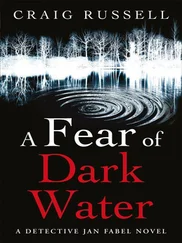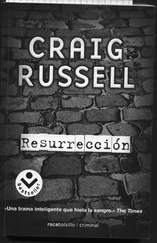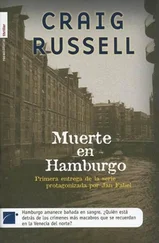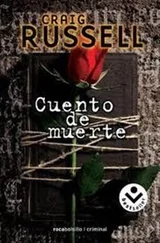Craig Russell - Dead men and broken hearts
Здесь есть возможность читать онлайн «Craig Russell - Dead men and broken hearts» весь текст электронной книги совершенно бесплатно (целиком полную версию без сокращений). В некоторых случаях можно слушать аудио, скачать через торрент в формате fb2 и присутствует краткое содержание. Жанр: Триллер, на английском языке. Описание произведения, (предисловие) а так же отзывы посетителей доступны на портале библиотеки ЛибКат.
- Название:Dead men and broken hearts
- Автор:
- Жанр:
- Год:неизвестен
- ISBN:нет данных
- Рейтинг книги:4 / 5. Голосов: 1
-
Избранное:Добавить в избранное
- Отзывы:
-
Ваша оценка:
- 80
- 1
- 2
- 3
- 4
- 5
Dead men and broken hearts: краткое содержание, описание и аннотация
Предлагаем к чтению аннотацию, описание, краткое содержание или предисловие (зависит от того, что написал сам автор книги «Dead men and broken hearts»). Если вы не нашли необходимую информацию о книге — напишите в комментариях, мы постараемся отыскать её.
Dead men and broken hearts — читать онлайн бесплатно полную книгу (весь текст) целиком
Ниже представлен текст книги, разбитый по страницам. Система сохранения места последней прочитанной страницы, позволяет с удобством читать онлайн бесплатно книгу «Dead men and broken hearts», без необходимости каждый раз заново искать на чём Вы остановились. Поставьте закладку, и сможете в любой момент перейти на страницу, на которой закончили чтение.
Интервал:
Закладка:
I watched for a while longer, ready to sprint down the stairs and out the back door, down the dark garden and over the high wall, broken glass or not, if I saw either car return. After five minutes that passed like five hours, I went back downstairs. I was aware that my heart was still pounding away and I felt sick. I was a pretty cool customer at the best of times, and I had talked, fought or run my way out of a lot of sticky situations, but now the stakes were higher than they had ever been.
I went into the downstairs WC and washed my face, patting it dry with the towel hanging on the back of the door. Easy, Lennox. Take it easy. I went through to the study and decided it was worth the risk of switching on the desk lamp.
The desk was a square, solid job and in no way unusual. Other than the desk lamp, all that was on the desk was an ivory Bakelite telephone, one of the GPO 200 series dating from the Thirties, a clock, address book, a pen and ink set, and a leather-trimmed rectangular desk-blotter. No Tanglewood in the address book. The blotter drew my attention. The otherwise pathologically fastidious Ellis had clearly had a habit of doodling on the blotting paper. Most of the doodles were on the right hand side of the blotter, while the telephone sat to its left. My guess was that the bizarre geometric shapes and curlicued letters had been done absentmindedly while Ellis had taken phone calls. It’s funny the route the unconscious mind takes to express itself independently of the conscious, and I examined the doodles closely. Again, if there was anything significant in amongst the scribbles and doodles, it escaped me.
Then I noticed something unusual. Everything on the blotter had been harmlessly doodled and left; sometimes over-drawn with something else, but never deliberately obscured. Except in one corner, the top right. There, Ellis had scored out something he had written. I peered at it but couldn’t make much sense of it. Something beginning with a T in it, but too short to be Tanglewood. More like initials. I thought about taking my glove off, licking my thumb and trying to rub off some of the obscuring ink, but inking my own fingers to leave prints would probably offend the coppers’ union. Instead I tore the corner off the blotting paper and reshuffled the sheet within its leather holder to conceal my vandalism as much as possible.
There was a bookcase along one wall; from what I could see, most of the books were technical manuals and textbooks, mainly concerning all things related to demolition, but also a few novels — the usual stuff: Hammond Innes, Dennis Wheatley, Nevil Shute. But what caught my attention most was a huge, single-volume English-Hungarian dictionary. I slipped it out from the shelf and took it over to the table. Pamela Ellis had been right about her husband’s obsessive note-writing. The dictionary had several sheets of paper jammed into its pages. Some were small notes with one or two words scratchily scribbled onto them, some with the English translations, some not. Others were full sheets, folded neatly in two, containing hundreds of immaculately copied out grammatical rules, or perfectly declined verbs. Ellis had certainly been serious about learning his original native language. As I looked through the dictionary, I found his dedication admirable. I could speak fluent French, reasonably good Italian and some German, but in each of these languages there was some identifiable commonality, some shared rudiments, that allowed you to build a bridge from one to the other. Hungarian, as far as I could see, was somewhere out there on its own.
I looked through the notes he had made. If there was a significance to be read in any of them, it was beyond my reading. I put the dictionary back.
I spent half an hour going through Ellis’s desk drawers. I did it carefully, methodically. Fruitlessly. There was nothing. I pulled drawers out, upended his desk chair to check beneath the seat, ran my fingers over every surface to find somewhere something significant could be hidden. Nothing. There were plenty of notes, that was for sure, a diary full of appointments, the address book full of contacts, but not a single reference to anything that could not be linked to his business or social activities. The only thing that leapt out at me was how unbelievably dull his day-to-day routine had been. Again the image of the dying man in my office came to mind and I couldn’t bridge the gap between the mundane life before me on the desk and the horror and drama of its end.
I checked my watch. I had spent three-quarters of an hour going through Ellis’s stuff and, although I had made an effort to do so methodically, it would take me another fifteen minutes to get everything back the way it had been. When I left, I wanted to leave no trace of where I’d been, nothing disturbed or out-of-place. The only evidence of a break-in would be the back door.
When I finished up, I felt frustrated. It had been a hell of a lot of effort and twice as much stress — and for absolutely nothing other than a torn-out doodle from a dead man’s desk blotter.
I made my way back through the kitchen, picking up the chisel on the way, and out into the garden. I closed the back door carefully, pushing some of the splintered wood back into place with my pigskin-gloved fingers. Depending on how often Pamela Ellis used her back door, it might be a day or two before the damage was noticed.
A waste of time.
I replaced the chisel in the drawer of the old desk in the garden shed. It was an odd-looking job: dense, dark wood. It had that sort of mittel-European solidity and I guessed it was Hungarian in origin, along with the heavy chest that looked like it had been hewn from the same forest. I wondered if it was some kind of heirloom passed down from Ellis’s Hungarian parents, but that didn’t make sense. From what Archie had passed on from Ferguson, the Eles family, like so many European refugees over the last hundred years, had left all their belongings and half their family behind them.
Then it struck me.
I had spent an hour in Ellis’s study scrabbling through paperwork that had told me nothing about the man. Yet the moment I had first stepped into this shed, I had had a real feeling that this was the space inhabited by his personality. It was here I should be looking. I thought again how Pamela Ellis had told me that her husband insisted that the shed was always kept locked, and how angry he got when she forgot.
I had a practical problem. In the house, with the curtains drawn closed, and in a back-facing study, it had been easy to search with the desk lamp switched on. But every second I spent in the shed, with its shadeless square windows and using my penlight to illuminate my searching, exposed me to a real risk of being seen. I got down on my knees, the penlight between my teeth, and pulled the drawers out one by one. They were heavy with tools and I eased each to the ground before emptying its contents, tool by tool. It was going to take an age.
Nothing in the first drawer. Or the second. Ellis had lined the bottom of each drawer with newspaper and when I emptied the third drawer, I eased up the newspaper to find a square, flat package wrapped in waxed paper. When I opened it, I found an Ordnance Survey map and nothing else. But there was no doubt that a real effort had been made to conceal the package, so I slipped it into the pocket of my duffle coat. At last, I was maybe getting somewhere.
The chest was locked with a heavy padlock. Retrieving the chisel from the desk drawer, I jammed it as a lever into the loop of the padlock and twisted, using all my strength, but it wouldn’t give. I was running out of time, but there was a difference in being stuck in the shed if Pamela Ellis and her escort returned and being caught in the house itself. Nevertheless, it was still a risk I didn’t want to take. I opened the shed door and leaned my head out, checking down the drive and the street as far as I could see it, and listening for any sounds nearby. Everything was quiet. I went back into the shed and took a large steel-headed mallet from where it hung on the shed wall. I swung. The padlock clashed and rattled but didn’t break. Hitting the padlock made too much noise and I was going to have to be quick. I hit it another three times, taking full swings at it and was rewarded with a deformed, but still clamped shut padlock. I tried the chisel again and this time the weakened padlock gave way.
Читать дальшеИнтервал:
Закладка:
Похожие книги на «Dead men and broken hearts»
Представляем Вашему вниманию похожие книги на «Dead men and broken hearts» списком для выбора. Мы отобрали схожую по названию и смыслу литературу в надежде предоставить читателям больше вариантов отыскать новые, интересные, ещё непрочитанные произведения.
Обсуждение, отзывы о книге «Dead men and broken hearts» и просто собственные мнения читателей. Оставьте ваши комментарии, напишите, что Вы думаете о произведении, его смысле или главных героях. Укажите что конкретно понравилось, а что нет, и почему Вы так считаете.
